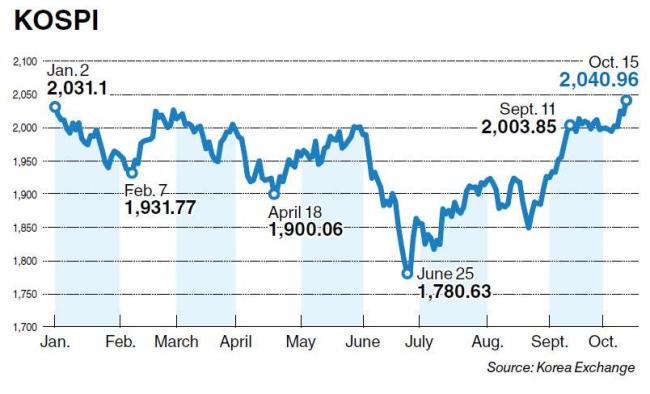Korea’s stock market is a day away from seeing a record buying spree by foreign investors purchasing Seoul shares across the board.

Foreign investors have invested in Korean shares listed on the KOSPI and tech-heavy KOSDAQ exchanges worth about 12 trillion won over the last 34 consecutive trading days since August 23, according to the Korea Exchange on Wednesday.
The Korean stock market would see its previous record in foreign investment in terms of consecutive trading broken should they continue their buying spree on Thursday.
The previous record of 34 straight days of foreign investment in Korean stocks was set in 1998 after the Asian financial crisis erupted.
Then, foreigners maintained their buying spree from January 20 to March 3 in 1998, the longing investment period by overseas traders.
Foreign shareholdings of Korean stocks accounted for more than 32 percent of market capitalization of the KOSPI and KOSDAQ, the highest ownership year to date, the KRX noted.
Korea’s relatively strong fundamentals, and rosier and stable growth outlook compared with other emerging markets in Asia such as India and Indonesia have driven foreign investors to reallocate their funds to Asia’s fourth largest economy.
Analysts expect that the stock market will undergo corrections going forward, but that foreign investors will remain attracted to Korea as an alternative investment destination to other Asian economies.
“Foreign funds could further enter the Korean market after the U.S. political parties reach an agreement over debt ceiling,” said Son Wi-chang, an analyst at Hyundai Securities.
But the market could also head for corrections, he added.
The U.S. is reportedly a step closer to sealing a deal to raise its federal debt limit just before the October 17 deadline, averting a default and continued shutdown of its agencies and public facilities.
Continued foreign investment was able to make up for share unloading by retail and institutional investors in the market where the benchmark KOSPI fell 0.31 percent to 2,034.61 on Wednesday.
However, Korean policymakers said that the country is far from seeing a “clear sign” of the economy recovering in the near term, and that it must remain alert as overflow of foreign capital into the markets could increase volatility if unforeseeable factors affect the Korean economy.
In a state audit by the National Assembly, Deputy Prime Minister and Finance Minister Hyun Oh-seok said that macroeconomic policy this year was focused on revitalizing the economy.
“But we still have a long way to go,” he briefed lawmakers on Wednesday, even though Korea was able to climb out of the low growth trap in the first half of this year, while recording improved economic data such as investment and consumption.
Still, external uncertainties remain such as the impending monetary stimulus cuts in the U.S. and growing concerns over fundamentals of emerging markets, Hyun said.